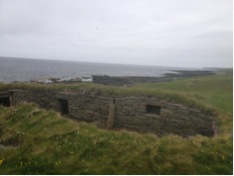Professor Jane Macnaughton writes: How was it that a group of ten philosophers, doctors, lawyers, a priest and an anthropologist, ended up playing Act 1 Scene 1 of King Lear in a renovated kelp (seaweed) store on the Island of Papa Westray, one of the most northerly of the Orkney Islands? We were there by the kind invitation and generosity of Paul McHarg (Professor of Legal Education at the Australian National University) and Michael McGhee (until recently, Professor of Philosophy at Liverpool University), both of whom have houses on the island.
Paul, an internationally renowned legal educator, had won a National Teaching Award, and decided to spend it bringing together a multidisciplinary group to debate the place of professional education in the academy. The full group comprised Beverly Clack (philosopher of religion at Oxford Brooks), Brendan Larvor (philosopher at the University of Herfordshire), Roger Kneebone (Surgical Educator at Imperial College and Wellcome Trust Engagement Fellow), Kevin Ilsley ( GP Educator), Tony Gash (literature and drama at UEA), Clark Cunningham (ethics and law at Georgia State University College of Law), Andrew Russell (medical anthropology, Durham) and myself (medical humanities, Durham). It is very difficult to sum up and do justice to five days of intense conversation and discussion in this eclectic group, but certain key themes emerged that we will be pursuing, probably by co-writing in a e-book, led by Paul. We all shared an unease about what seemed to be conflicting sets of agendas in higher education: outcomes oriented courses and competence based learning squashing spontaneity; regulation overcoming fun and playfulness; the need to ensure students are ‘employment ready’ driving out expansiveness. We all agreed that higher education should be about formation and reformation of minds, rather than providing information or stagnating in conformation. But the demands of regulation, standards and employment and skills are not-unreasonable in today’s world where HE institutions in the UK are now competing in a ‘market’ for paying students.
So how are exploration, playfulness, fun, spontaneity possible within this controlled context, and how are we as academic teachers, with the huge responsibility for encouraging formation and reformation of minds, to imbue our students with these feelings about higher education? Well, that was where the Kelp Store came in. After two days of intense round-table discussion (never more than an hour away from freshly baked cake, bannocks and cheese and the most marvellous gourmet dinners) we shifted venue to this stark, stone-built building on the eastern shore of Papay.
Here Tony Gash shifted to directorial mode, and introduced us to what may be familiar to blog readers but which to many of our group was a new idea: that lines of a play – or indeed any statements – could be described as ‘speech acts’. The term originates with the philosopher J. L. Austin, author of How to do Things with Words (1962).
Tony had translated sentences of the first scene of Lear into a series of speech acts for us, so that Lear’s imperious ‘Know that we have divided in three our kingdom..’ became ‘I make a public announcement to you all’; and Cordelia’s ‘What shall Cordelia speak’, was ‘[aside to audience] I ask for your help’. Actors were provided with two prompters, one to give the speech act, and one the lines. We were thus tightly controlled and wrapped about with strict guidance by which we had to deliver our lines. And the amazing thing was how much creativity and emotional depth seemed to be energised by virtue of the constraints. Many of us had tears in our eyes as that strange, chilly space became Lear’s court room and us his courtiers, prospective sons-in-law and daughters.
I think we all need time to digest what this experience might mean for our interactions with our students, but it certainly left me with huge hope about what we can achieve not just despite, but perhaps because of, the strictures within which we now work in HE. For medical humanities, it was a true object lesson in the power of drama to draw out human truths from the depth of us all and to imbue everyday spaces with the emotional power those truths contained.






Pingback: Papay Convivium — Paul Maharg